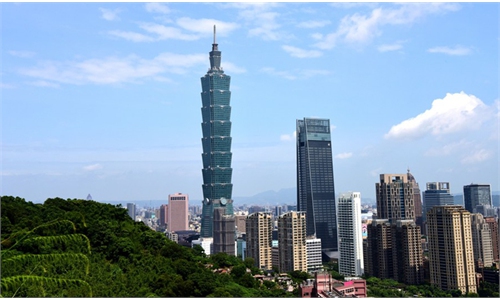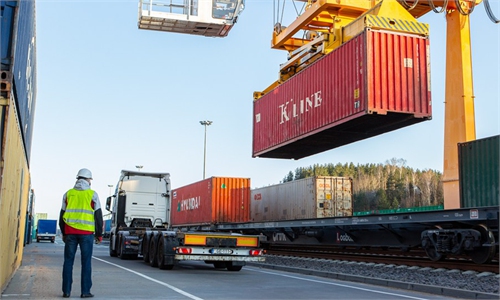China recalls ambassador to Lithuania over Taiwan question, 'diplomatic relation cut-off’ possible

View of Vilnius, capital of Lithuania Photo: VCG
China announced it will recall its ambassador to Lithuania and demanded that the Lithuanian government recall its ambassador to China, as a countermeasure in response to the Baltic country's act to allow the separatist Taiwan authorities to open a "representative office" under the name of "Taiwan," which Chinese observers called a "serious" and "rarely seen" countermeasure against the vicious move of Lithuania in challenging China's core interests and sovereignty, and they said the possibility of a "diplomatic relations cut-off" cannot be ruled out if the Lithuanian government fails to correct its mistakes on the Taiwan question.
Chinese experts pointed out that this small country's strategy is to woo and follow the US and be a "loyal puppet" that barks the fiercest at the US' strategic rivals in exchange for protection. They warned that Lithuania will eventually pay the price for its violation of international rules.
A spokesperson of the Chinese Foreign Ministry said on Tuesday that the Lithuanian government, in disregard of China's repeated representations and articulation of potential consequences, has announced its decision to allow the Taiwan authorities to open a "representative office" under the name of "Taiwan." This brazenly violates the spirit of the communiqué on the establishment of diplomatic relations between China and Lithuania and severely undermines China's sovereignty and territorial integrity, said the spokesperson.
China warned Lithuania that there is only one China in the world and the People's Republic of China is the sole legal government representing the whole of China, said the spokesperson.
The Chinese government and people have unswerving determination to achieve reunification of the country. The red line of safeguarding national sovereignty and territorial integrity shall not be crossed, according to the spokesperson.
"We urge Lithuania to immediately rectify its wrong decision, take concrete measures to undo the damage, and not to move further down the wrong path. We also warn the Taiwan authorities that 'Taiwan independence' is a dead end and any attempt at separatist activities in the international arena is doomed to fail," said the spokesperson.
In July, the island of Taiwan said that it had reached an agreement with Lithuania to open a "representative office" in the Lithuanian capital, which is a serious provocation of the Chinese mainland.
Liu Zuokui, a research fellow on European studies at the Chinese Academy of Social Sciences in Beijing, told the Global Times on Tuesday that recalling an ambassador is a serious setback in bilateral relations and a "rarely seen" diplomatic move, which would have a considerable impact on China-Lithuania relations.
Chinese experts believe that the Lithuania's move is more serious than the Czech Senate Speaker Milos Vystrcil's visit to Taiwan in August 2020 as the Czech politician did not represent the Czech government, but there is no doubt that Lithuania's latest move is a government action, so a big backlash from Beijing was expected.
Cui Hongjian, director of the Department of European Studies, China Institute of International Studies, told the Global Times on Tuesday that what Lithuania has offended is China's core interests and it has directly affected the political foundation of bilateral relations. Cui noted that Beijing's recall of its ambassador is intended to convey an explicit stance that the Lithuanian government's move is absolutely unacceptable. Still, experts believe China has left leeway for Lithuania to correct its mistakes on the Taiwan question by not expelling Lithuanian ambassador to China but urging the Lithuanian government to recall its ambassador.
Liu warned that as long as "official exchanges" between Lithuania and the island of Taiwan are not cut off, China's relations with Lithuania will not improve.
The possibility of a "diplomatic relation cut-off" between China and Lithuania cannot be ruled out if the Lithuanian government fails to correct its mistakes, Liu said.
Xin Qiang, deputy director of the Center for US Studies at Fudan University, noted that China's decision to recall the ambassador is a warning to other certain countries and regions in Europe of not misjudging the situation and following Lithuania's footsteps, and is also a warning to the US which may exploited Lithuania's move to make more trouble.
Recalling Chinese ambassadors is rare in the history of China's diplomacy. Due to a similar reason related to the Taiwan question, China recalled its then-ambassador to the US Li Daoyu in 1995, after Washington allowed former Taiwan regional leader Lee Teng-hui to "visit" the US.
A spokesperson of the Taiwan Affairs Office of the State Council warned the Taiwan DPP authority on Tuesday that it will have to take the consequences for colluding with external forces to seek secessionism and provocation.
No one should underestimate China's strong determination, firm will and strong ability to safeguard national sovereignty and territorial integrity, the spokesperson said.
Exploited as cannon fodder
After China announced the decision, the Lithuanian Foreign Ministry said it was "regretting this move of China," and it reiterated that "in line with the one-China principle Lithuania is determined to pursue mutually beneficial ties with Taiwan like many other countries in the European Union and the rest of the world do," according to a statement of the Lithuanian Foreign Ministry.
The statement faced an angry backlash on Chinese social media, with many netizens commenting the Lithuanian government did not show any repentance after maliciously poisoning bilateral ties that incurred wrath from China but is insisting on being the "cannon fodder" for the US' anti-China tricks. Many called on the Chinese government to slap economic sanctions on the country.
"The 'one-China principle' Lithuania said indicated it supported Taiwan to represent China. As a small country, it just wanted to show its existence and be a watchdog of the US. Let's just ban all flights from Lithuania from flying over the Chinese mainland," one netizen said.
Liu said Lithuania's response was hypocritical, trying to justify its provocative actions and cooling things down by involving the EU, but it cannot change the fact that it has seriously violated the one-China principle.
After China's decision to recall its ambassador, the relationship between the two countries has entered a period of observation, and we need to observe whether there will be any real tangible move by Lithuania to cool the issue. If the issue can be resolved at the diplomatic level, it will be good for bilateral relations, Liu said.
Anti-China forces in Lithuania have been in uptrend this year. Lithuanian lawmaker Dovile Sakaliene who was among some EU personnel sanctioned by China in March over Xinjiang-related issues, immediately responded on her Twitter that "We are NOT sorry for deciding to open Taiwan representative office in Vilnius."
Sakaliene has long been pointing fingers at the Chinese government's policies in its Xinjiang Uygur Autonomous Region with rumors and disinformation.
In May, Lithuania, with a population of less than 3 million, announced that it was quitting the "17+1" cooperation mechanism, a platform between China and Central and Eastern European Countries, claiming it has not brought trade benefits it expected. In the same month, Lithuania's parliament passed a resolution to describe China's treatment of Uygurs as "genocide" and "crimes against humanity."
From January to April 2021, bilateral trade volume between China and Lithuania was $804.57 million, with year-on-year growth of 21 percent. Lithuanian trade with Taiwan during the same period was only $45.9 million, Shen Zhifei, Chinese Ambassador to Lithuania, wrote in an article published in Lithuanian media on Saturday.
It is up to the Lithuanian government and people to make a wise choice whether to violate the one-China principle and deliberately undermine the normal relations between China and Lithuania at the expense of the interests of Lithuania and its people, Shen said.
Taiwan DPP authority conspiring with the Taiwan secessionist forces sought so-called "international space," and "sovereign status" in the name of carrying out economic, trade and cultural exchanges, and what lies behind their moves is seeking their own political interests and abandoning the common interests of all Chinese people including Taiwan people, Shen said.
Judging by Lithuania's response which said it was "determined" to develop the same mutually beneficial relations with the island of Taiwan as other EU countries, the EU's position over the issue will become important, Liu said.
Cui believes that the changes in the China-Lithuania relationship have something to do with the difficulties and challenges in the current China-EU relations.
He explained that the most important reason for the recent change in Lithuania's China policy is the "resonance" between its domestic political changes and international geopolitical changes - that is, the new Lithuanian government changed its judgment on geopolitics after taking office, and the Biden administration has exerted influence on the small country. As a result, Lithuania has been capricious in its foreign policy.


